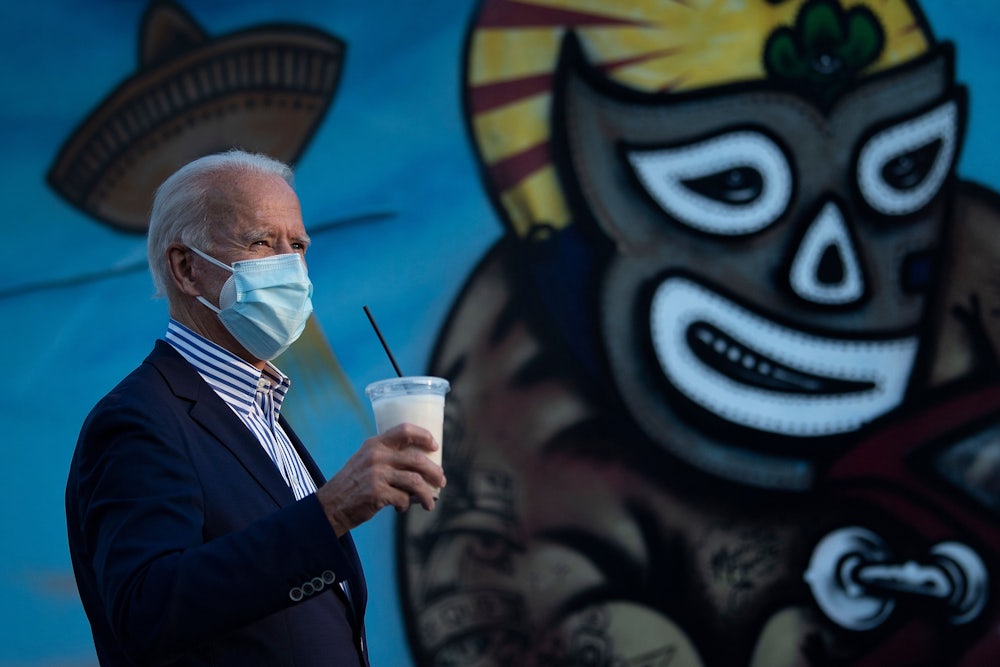This has probably been Joe Biden’s best week since Super Tuesday. Donald Trump’s reelection campaign is imploding, Biden’s lead is expanding (by 10.2 percent, according to FiveThirtyEight’s poll of polls), and he appears to have a sizable advantage in key swing states. Georgia and Texas may very well be in play. Kamala Harris’s performance in Wednesday’s vice presidential debate, which was fine, has already been forgotten, subsumed by the usual flood of Trump news. Biden can simply sit back and watch as his opponent destroys himself—which is, more or less, exactly what Biden has been doing.
But campaign reporters have seized on one flaw: Biden’s refusal to answer questions about whether he would pack the Supreme Court if elected. Hand-wringing about the campaign’s lack of clarity only increased after Harris dodged a question about it during Wednesday’s debate. And it reached a fever pitch after Biden said he’d have an answer “when the election is over.”
“Can he really hold to this same answer for 26 days?” The Washington Post’s fact-checker Glenn Kessler asked. “Not sure I’ve ever seen a politician explicitly say I’m not telling you what I think about an important issue until after you vote for me,” tweeted Axios’s Jonathan Swan. The Hill’s Joe Concha wrote, “This question should continue to be asked until Biden commits one way or another. A decision of this magnitude altering the course of the third branch of government forever cannot be just shrugged off.”
But Biden and Harris have answered the question—just not in a way that satisfies myopic campaign reporters.
Biden, to be fair, did himself no favors by playing coy. “You’ll know my opinion on court-packing when the election is over” is not a satisfactory answer. Still, it’s not exactly a dodge, either. It is, in fact, a neat summation of his campaign’s actual position. Republicans, right now, are racing to fill a Supreme Court vacancy that opened up after Justice Ruth Bader Ginsburg’s death, only 45 days before the presidential election. In contrast, in 2016, they held a vacancy open for more than a year, rejecting Barack Obama’s nominee on specious historical grounds, and waiting until they regained the White House to confirm a conservative justice. If Amy Coney Barrett’s nomination goes through, Biden can claim, with some authority, that the Republicans have stolen two Supreme Court seats since 2016.
The Biden campaign’s position is that the next president should fill the current vacancy. “The American people are voting right now, and it should be their decision about who will serve on this most important body for a lifetime,” Harris said in Wednesday’s debate. When Biden says that you’ll know his opinion after the election, he means that his position is dependent on whether or not the Senate confirms Barrett before the election or, should Biden win, during the lame duck. If Barrett’s nomination is for some reason abandoned and Biden wins, it’s safe to assume that judicial reform, let alone outright court-packing, will not be at the top of his agenda.
But if Barrett is confirmed and the court has a 6–3 supermajority of conservatives, two of whom were nominated under at best highly sketchy circumstances, Biden is keeping his options open. “You’ll know my opinion on court-packing when the election is over” is both Biden’s actual position and a perfectly reasonable one to take, given the circumstances. What a President Biden would do is dependent on what happens between now and his inauguration. By keeping the question open, Biden is also answering it: Everything, including court-packing, is on the table if Barrett goes through.
The Trump campaign keeps hounding Biden and Harris about this because it wants to paint the Democrats as radicals. Journalists, it seems, want the same thing. Instead of drilling down on Biden’s contingency plan for the court, they’re obsessing over the fact that he allegedly “didn’t answer the question,” which suggests some sort of underhandedness or lack of transparency. A more detailed understanding of Biden’s court reform options would be useful in the lead-up to the election, but the question of whether Biden supports “court-packing” has become a distraction from that.
The larger problem with the coverage of Biden’s court-packing nonresponse is that it omits what’s driving his campaign’s thinking. As Jess Coleman wrote in his newsletter, the way it’s asked about by the media, “court packing is just another policy proposal on par with Medicare for All or a wealth tax.” But court-packing is not really like those things at all. A conversation about court-packing requires a discussion about the increasingly anti-democratic tilt of the Republican Party and the fact that three Supreme Court justices were nominated by a president who lost the popular vote (five, if you include George W. Bush, who lost it during his first presidential campaign but won it during his second, after which he nominated two justices). And it requires addressing the extraordinary power grab happening right now in the Senate, with Mitch McConnell rushing through a Supreme Court justice with less than a month before the election.
One reason the Biden campaign is playing coy with the question is because it understands it’s a trap. It assumes that the Republican approach to the courts is somehow legitimate, whereas the Democratic response—a necessary corrective to the GOP’s corruption—is seen as a trampling of constitutional norms.
The most infuriating aspect of this supposed controversy is the idea that it is, somehow, comparable with Trump and Pence’s refusal to commit to a peaceful transition of power. Biden is keeping the issue open with the understanding that reform may be necessary to ensure the court’s legitimacy as an institution—and to prevent it from becoming a means of preserving minority rule for white conservatives in perpetuity.
